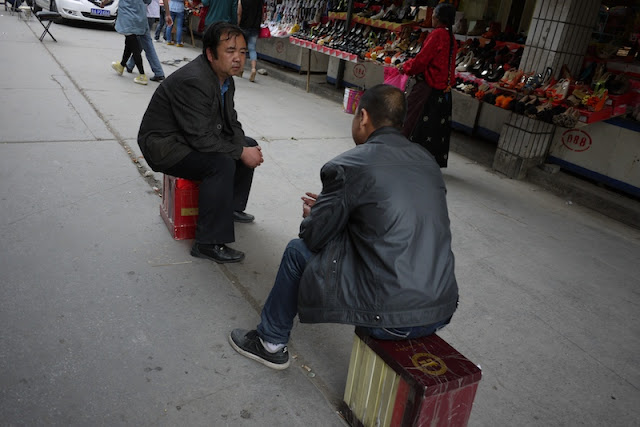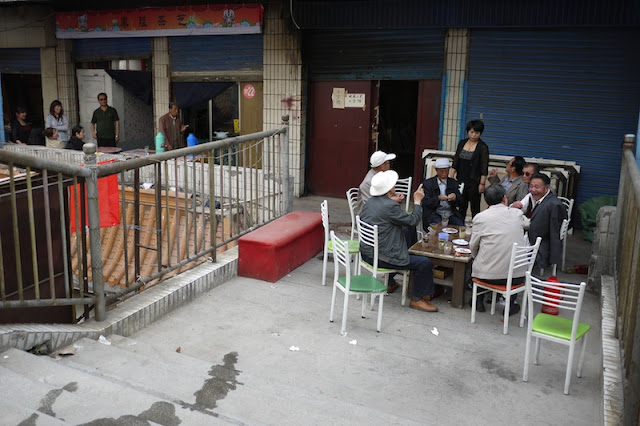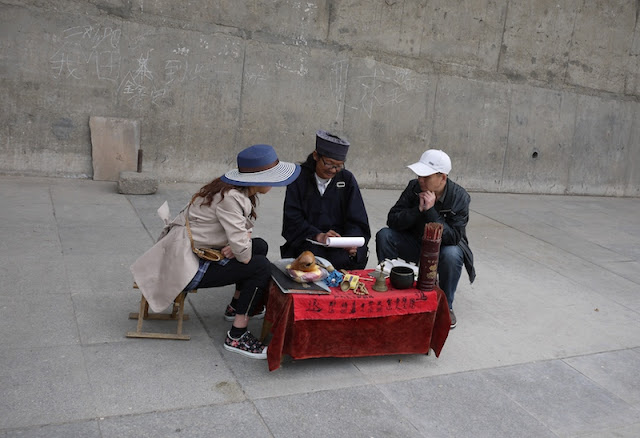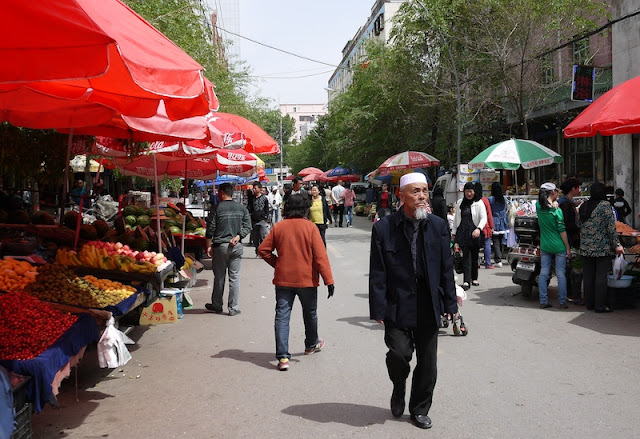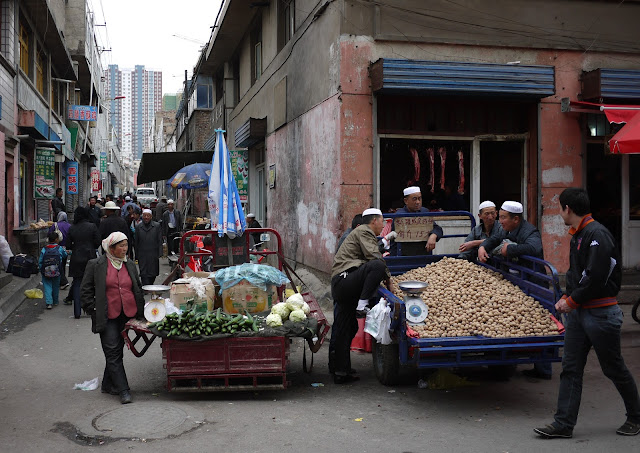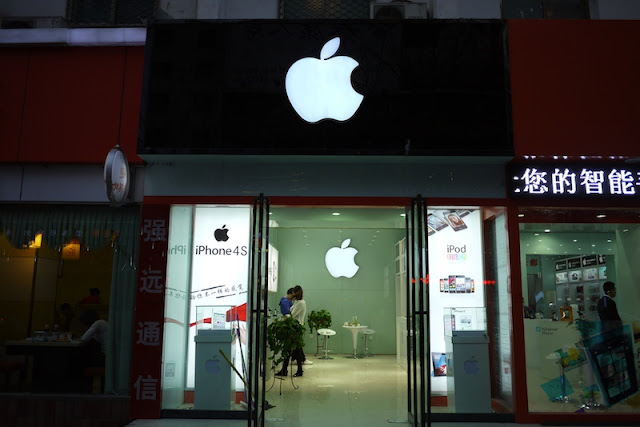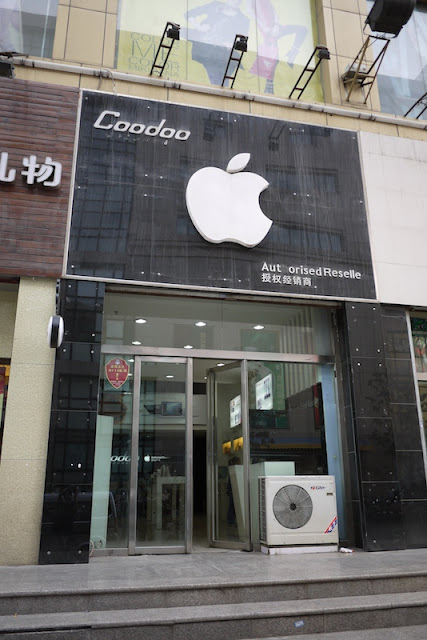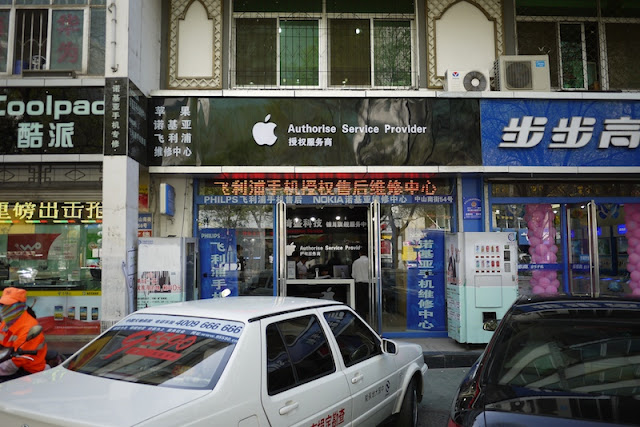[UPDATE at end]
According to recent reports,
new genuine Apple Stores will open in the Chinese cities of Shenzhen and Chengdu. These will be the first Apple Stores outside of Beijing and Shanghai in mainland China. Shenzhen is an intriguing location for a new store since
its border has been a significant entry point for
Apple products smuggled into mainland China from Hong Kong due to differences in prices and availability.
In addition to several Apple Stores in China, there are numerous authorized resellers of Apple products. But there are many more
unauthorized resellers, examples of which I shared
here and
here. I also shared an example
here of an unauthorized reseller with a website nearly identical to Apple's. All of those examples came from Southeast China, so I will now share examples of unauthorized stores in the northwestern city of
Yinchuan in Ningxia Hui Autonomous Region (Ningxia is similar in stature to a Chinese province). In addition to serving as evidence that unauthorized resellers are not limited to a specific region of China, they provide an opportunity to discuss some of the concerns Apple may have about such stores.
Like before, I did not deliberately seek out any of these stores. I opportunistically took the photographs on several occasions while I walked around Yinchuan's central Xingqing District. Here are just a few of the stores I saw selling Apple products:
In all of the examples above an Apple logo is prominently displayed in the location above the main entrance where one could expect a store's name, even in China.
Apple's online list of authorized resellers as of today shows only one authorized reseller in all of Yinchuan or anywhere else in Ningxia (note: an employee at the
Apple Store in Hong Kong insisted to me that this list is regularly refreshed and reliable). Based on the store's address it is not any of the stores displayed above or later in this post. However, these stores not being listed as authorized is in itself not a problem since it is reportedly
not illegal to resell genuine Apple merchandise in China.
Regardless, in a country with so many fake products some consumers may be especially motivated to buy Apple products from stores reviewed and authorized by Apple. That is what makes these other unauthorized stores in Yinchuan even more intriguing:
Although Apple likely does not want stores stating they are authorized resellers when they are not, Apple is likely more concerned about protecting the Apple Store identity. The
famous fake Apple Store store in Kunming received attention from Apple not because it was unauthorized, but because of the extreme measures it took to appear as a genuine Apple Store. In short, whether Apple pursues any action against a store in China is probably related to the likelihood a consumer will incorrectly believe they are shopping at a store operated by Apple. A quick estimation based on what I have seen suggests
there are thousands of unauthorized Apple resellers in China, many of which may be misusing Apple's trademarks to a variety of degrees. If Apple wished to pursue every potential case it could have a huge challenge ahead of itself. But at the moment I see no indications that Apple will take any significant action unless a store goes to more extreme lengths to imitate a real Apple Store. In that case, Apple has taken a more pragmatic approach and the situation is far more manageable.
The famous store in Kunming crossed several significant lines which made it worthy of Apple's attention. For example, the staff believed they worked for Apple and wore shirts identical to those worn by Apple Store employees. The second factor is why these two stores in Yinchuan particularly caught my attention:
In both stores, employees were wearing shirts that appeared to be similar, if not identical, to the Apple Store shirts.
When I spoke with two of the employees in the second store, I asked them if the store was an "Apple Store". One quickly said it was. Then the second jumped in and said it was not. She explained that their products were genuine and from an official Apple Store in Beijing. She did not believe she worked for Apple. At no point did the employee appear to evade any of my questions, and I never had the impression she was concerned anything might be amiss.
So, are any of the above stores enough to get Apple's attention? All I can say is that in most ways they are not highly unusual in comparison to many other unauthorized stores I have seen. They also did not go to the same extremes as the store in Kunming. Nonetheless, I suspect those Apple Store shirts could cause some feathers to be ruffled at Apple.
I could now go on and on and share examples of stores in other cities in China that to varying degrees may be infringing on the identity of genuine Apple Stores.
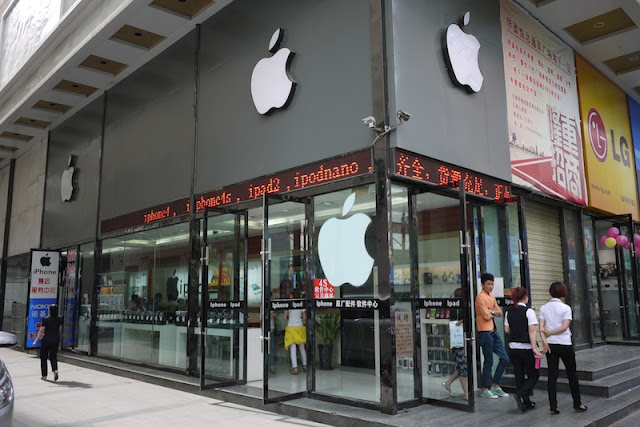 |
| Unauthorized store in Lanzhou, Gansu province |
 |
| Unauthorized store in Xining, Qinghai province |
But I shall refrain. I think I have already sufficiently made my point. Again, there are many unauthorized stores across China and it does not appear that Kunming or Southeast China is special in this regards. But based on my experiences, the famous store in Kunming remains a special example.
Finally, I want to give credit where credit is due in Yinchuan, namely this business:
Despite the English mispelling, this Apple Authorized Service Provider is indeed listed in
Apple's online locator. Consistent with my observations of what was for sale in Yinchuan's unauthorized stores, it only offers services for iPads, iPhones, and iPods -- no service for Macs. So, Yichuanese can rest assured they have a convenient and authorized option for servicing some of the Apple products they may buy, whether at Yinchuan's single authorized reseller, Yichuan's unauthorized resellers, or elsewhere.
UPDATE: Now tired of seeing "fake"
stores? Then maybe the Chinese mobile phone with an apple logo in this post will interest you: "
Insights and Headaches for Apple: The iPncne in China".
